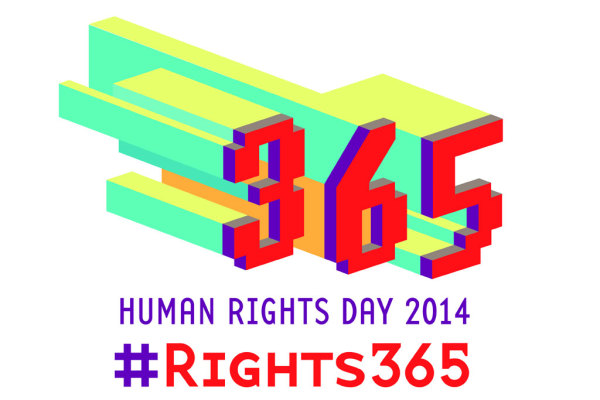The universal reach of human rights should not be restricted to one day alone but extended to every day of the year, top United Nations officials declared on 10 December 2014 as they marked Human Rights Day – an annual UN-backed event commemorating the date on which the General Assembly adopted the Universal Declaration of Human Rights.
Spearheaded by the Office of the UN High Commissioner for Human Rights (OHCHR), this year’s observance – celebrated under the banner of Human Rights 365 – encompasses the idea that “every day is Human Rights Day” and that “each one of us, everywhere, at all times is entitled to the full range of human rights.”*
“On Human Rights Day we speak out,” Secretary-General Ban Ki-moon proclaimed in his message. “We declare that human rights are for all of us, all the time: whoever we are and wherever we are from; no matter our class, our opinions, our sexual orientation.”
More Than Personal Tragedies
“Violations of human rights are more than personal tragedies,” Ban continued. “They are alarm bells that may warn of a much bigger crisis.
The Secretary-General explained that as a result of those “alarms,” his Human Rights Up Front campaign – launched in 2013 – sought to anticipate violations before they degenerate into mass atrocities or war crimes while advancing the struggle against injustice, intolerance and extremism.
We declare that human rights are for all of us, all the time: whoever we are and wherever we are from; no matter our class, our opinions, our sexual orientation.
The initiative includes training UN staff on the world body’s core purpose of promoting respect for human rights; providing Member States with the information needed to respond to human rights violations; and ensuring that UN personnel around the world are more attuned to situations where there is a risk of serious human rights abuses and are equipped for the responsibilities that such potential crises entail.
The strategy also includes achieving more Organizational coherence by strengthening engagement with the General Assembly, the Security Council and the Geneva-based UN Human Rights Council and providing earlier and more streamlined support to teams on the ground before a crisis emerges; and better organization of human rights staff so that they can identify risks of serious violations of human rights that could lead to atrocities.
Finally, underpinning all these activities will be better information management on threats and risks to populations for planning operational activities and for sharing with Member States.
The Power to Change the World
In his statement issued for the Day, UN High Commissioner for Human Rights, Zeid Ra’ad Al Hussein, echoed Ban’s appeal and underscored the power of the Universal Declaration to “change the world.”
“Human rights are not country-specific. They are not a reward for good behaviour or particular to a certain era or social group. They are the inalienable entitlements of all people, at all times and everywhere, 365 days a year,” affirmed Zeid.
As part of its celebration of the Day, the OHCHR has launched a social media campaign encouraging the public to explain on a six-second Vine post why year-round human rights matter. The Vine videos will then be collected and published together on OHCHR’s Storify account.
“The UN Human Rights Office stands with the millions of people around the world whose voices are denied,” Mr. Zeid continued, as he called on the public to join OHCHR “via social media or in person.”
“Together, we must demand what should be guaranteed: our human rights, universal, indivisible, inalienable, for everyone, 365 days a year.” (*Source: UN Release).











